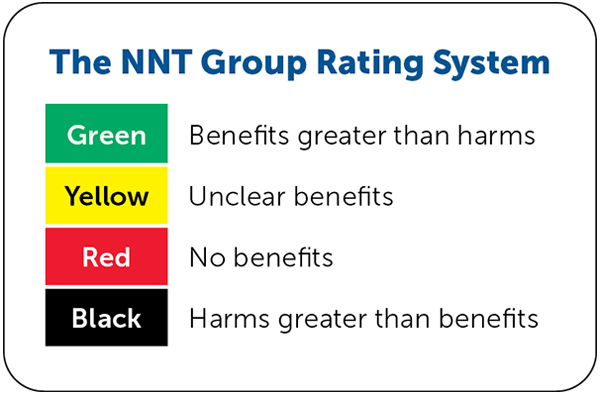
Am Fam Physician. 2015;92(9):online
Author disclosure: No relevant financial affiliations.

| Number needed to treat = 4 for bloating, stool consistency, and less interference with daily life; number needed to harm = 9 | |
|---|---|
| Benefits | Harms |
| 1 in 4 had improved bloating and stool consistency, and less interference with daily life | 1 in 9 experienced medication adverse effects |
| None had improved abdominal pain | |
| None had improved overall symptom score | |
Details for This Review
Study Population: Adults receiving selective serotonin reuptake inhibitors (SSRIs) as therapy for irritable bowel syndrome
Efficacy End Points: The effectiveness of SSRIs compared with placebo on global assessment, abdominal pain, and improvement in overall symptom score
Harm End Points: Medication adverse events
Narrative: A Cochrane review evaluated six randomized controlled trials (RCTs) that used SSRIs vs. placebo and one trial that used both SSRIs and tricyclic antidepressants vs. placebo in patients with irritable bowel syndrome (IBS). The proportion of female patients ranged from 55% to 88%; all studies used Rome I or II criteria to diagnose IBS. SSRI agents included fluoxetine (Prozac), paroxetine (Paxil), and citalopram (Celexa). Subgroup analyses suggested an improvement in global assessment (clinical summary based on abdominal pain, bowel function, and overall well-being) for SSRIs compared with placebo (relative risk [RR] = 1.79; 95% confidence interval [CI], 1.01 to 3.20; P = .05; 227 patients). However, there was no improvement in abdominal pain (RR = 2.29; 95% CI, 0.79 to 6.68; 197 patients) or in overall symptom score (summary measure of abdominal pain, diarrhea, and constipation [RR = 1.36; 95% CI, 0.81 to 2.27; 72 patients]).1
A second systematic review and meta-analysis evaluated seven RCTs comparing SSRIs with placebo in 356 patients with IBS. This review included all of the RCTs found in the Cochrane review and one additional RCT, which was the only study conducted in a primary care setting. Compared with placebo, SSRIs reduced IBS symptoms by 32% (95% CI, 9% to 49%). The number needed to treat for symptom reduction with SSRIs was 4 (95% CI, 2.5 to 20). Although adverse events were not stratified by SSRIs vs. tricyclic antidepressants, the incidence of adverse events was significantly higher among patients taking antidepressants vs. placebo (RR = 1.63; 95% CI, 1.18 to 2.25). There were no serious adverse events. The number needed to harm was 9 (95% CI, 5 to 111).2
Caveats: SSRIs improved global assessment (a composite outcome measure) but not abdominal pain or overall symptom scores (individual end points) in adults with IBS (Rome I or II criteria). Composite end points are prone to bias, and should be regarded warily, particularly when clinically meaningful component end points do not show benefits.3 Although not explicitly defined in either meta-analysis, global symptom scores seeminglyly provide an overall summary based on abdominal pain, bowel function, and general well-being, and therefore may have utility in detecting group differences in complex symptom-based conditions like IBS. In general, the quality of the evidence noted in these systematic reviews is low and the number of participants is small; therefore, the strength of any conclusions is weak.4 In addition, adverse events data were poorly reported among trials of psychological therapies with SSRIs. Hopefully, future RCTs will track and report these data more completely.
The Rome III criteria are used to diagnose IBS, but the studies included in these systematic reviews used Rome I or II criteria, which are less accurate in diagnosing IBS.1,2 In addition, it is helpful to distinguish the subtype of IBS (i.e., constipation-predominant, diarrhea-predominant, or mixed type). The subtype was not included or separated in the studies examined here, making it difficult to determine if SSRIs are more helpful in one or more subtypes. Only three SSRIs were evaluated in these studies, and generalizations to newer SSRIs may not be appropriate. SSRIs are not approved by the U.S. Food and Drug Administration (FDA) for use in patients with IBS. In addition, most studies were conducted in tertiary care settings, and the results may differ in primary care settings.
It is important to note that IBS is an ideal target for placebo studies. One study enrolled 262 adults with IBS diagnosed by Rome II criteria into a six-week, single-blind, three-arm RCT with the primary outcome of response on the global improvement scale.5 The investigators found that the placebo effect can be progressively combined to reflect a graded dose response to individual component parts.5 Another RCT of 80 adults with IBS diagnosed using Rome III criteria found that patients given open-label placebo had significantly improved global improvement scores compared with the no-treatment group.6 One study examined publication bias for FDA-registered antidepressant studies and found that about one-third of these studies, accounting for about 3,400 study participants, were not published.7 Although this study could not determine the source of bias, it concluded that selective reporting of clinical trials may have adverse consequences for researchers, physicians, and patients by overestimating effects.7
For the past decade, Irving Kirsch has argued that there is publication bias and differential adverse events bias in trials of SSRIs. Kirsch analyzed published and unpublished data and concluded that reported benefits of antidepressants are primarily due to an increase in adverse events occurring in SSRI groups compared with placebo groups.8 Kirsch argues that this differential effectively induced additional favorable placebo effects in SSRI groups in trials, enough to statistically account for the benefits reported in depression trials. With the high rate of placebo response in patients with IBS and the high likelihood of selective publication bias, it is difficult to know the true effect size, if any, of SSRIs in patients with IBS.
This series is coordinated by Dean A. Seehusen, MD, MPH, AFP Contributing Editor, and Daniel Runde, MD, from the NNT Group (theNNT.com).
A collection of Medicine by the Numbers published in AFP is available at https://www.aafp.org/afp/mbtn.
This review is available from the NNT Group at http://www.thennt.com/nnt/effectiveness-selective-serotonin-reuptake-inhibitors-irritable-bowel-syndrome/.
